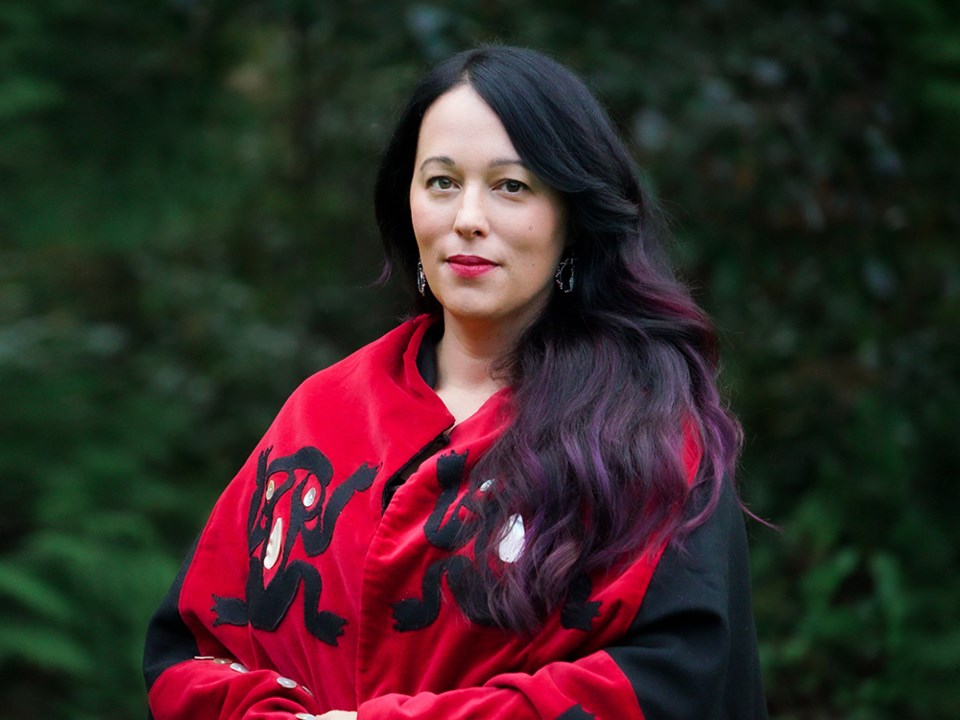In the last two federal elections, the Liberal Party of Canada has never finished higher than third place in the North Island-Powell River riding. This year, however, Liberal candidate Dr. Jennifer Grenz hopes to change her party’s fortunes.
Grenz finished her PhD in integrated studies and land systems at UBC last year, looking at the application of Indigenous worldviews to ecology, and what Indigenous ecology could offer in terms of solutions to the climate crisis.
While completing her studies, Grenz ran her own ecological restoration business. Her work took her to regions all across the riding, which, she said, she knows like the back of her hand.
“When you stay somewhere, you get to know all the people,” said Grenz. “When you’re working on environmental issues, you work with lots of different people, whether they’re in industry or other environmental nonprofit organizations, or just concerned citizens.”
Grenz is Nlaka’pamux and her family is from Lytton First Nation, located in the village of the same name that burned down last June amid record-breaking temperatures, driven by climate change.
“So quite obviously, the climate crisis is very much in the front of my mind,” added Grenz.
However, Grenz stressed that she is not a single-issue candidate, and sees the climate emergency as interwoven through other major issues such as housing, jobs and food security.
“When I think about what the purpose would be in serving in government, it’s more about: how do we build thriving and resilient communities?” said Grenz.
Climate priorities attract candidate
The Liberal government under Justin Trudeau has been heavily criticized for its record on addressing climate change, after Canada was the only G7 country whose greenhouse gas emissions increased between 2015 and 2019.
However, Grenz said she worked for environmental nonprofit organizations during former Conservative prime minister Stephen Harper’s tenure, which she described as a difficult and stressful time.
“What attracted me to the Liberal Party back then was the hope that investments would be made and priorities would be made to attend to climate,” she explained. “[The Liberals] are walking their talk in terms of investing in climate, valuing science, funding the science on climate crisis, and recognizing that the climate crisis is in so many of those major issues.
“This is the party that is going the right trajectory on climate,” she added. “Is there room to always improve and do better? Absolutely.”
Another issue the Liberals have taken flak for is housing. Despite the Trudeau government’s National Housing Strategy, rents and house prices in the qathet region have continued to skyrocket amid an ongoing crisis, a trend only worsened during the pandemic.
Grenz said she believes housing is primarily the jurisdiction of provincial governments, but that there is a significant role for the federal government to play in terms of bringing jurisdictions together and leading the ways in which communities are designed.
“This is where I see the void, and our region’s voice is missing in Ottawa,” said Grenz. “Having housing purchased out by people who are coming for recreational purposes to our region is a huge issue.
“This is why it’s so important that we actually have someone with a seat at the table in Ottawa, to flag these very regional issues that cause housing insecurity,” she added.
Grenz said a related issue to housing affordability is employment stability, noting that many people in the riding have to work multiple jobs.
“COVID has really shown how vulnerable many of those jobs are,” said Grenz. “I see the gaps in this government so far. I think the housing strategy has done a good job, but again, I think these regionally specific issues need a voice and need action.”
In recent months, unmarked burial sites of more than 1,300 Indigenous children have been found at former sites of Canada’s genocidal residential school system. Grenz said Indigenous peoples have known about these atrocities for a long time, and that non-Indigneous people are finally listening to the issue.
“It’s an awakening in our country; although it’s taken too long, I’m so glad that we’re at this point,” said Grenz. “We’ve been trying to work on reconciliation in so many different parts of our colonial existence, but we were always going to come up short until we had the truth part. I think we’re there.”
Grenz said she believes the reckoning that has occurred over the past few months would not have happened without a federal government that she sees as acknowledging the need to hear the stories about residential schools.
“It was an important step in the healing process, and I wish that physical proof wasn’t required to make people actually really acknowledge it,” said Grenz. “I wish that our communities didn’t have to be re-traumatized by what’s happening right now for everybody else to get it.
“But at the same time, this is part of the healing, and I’m so proud that we have a government that is investing in this process, that is allowing it to be led by Indigenous communities.”
Grenz added that the process of reconciliation isn’t just one thing, but has many pieces to it.
“I see a demonstration of that, and so many of the areas that I work within, Indigenous-led stewardship and Indigenous-led fisheries, value feeling like our knowledge and our worldview have a value in guiding policy and natural resource management,” said Grenz. “These are things that we didn't have before.
“I have hope this is just going to continue and be built upon, and I don’t have that kind of certainty with other parties.”
2021 North Island-Powell River riding federal election candidates:
Rachel Blaney (NDP)
Shelley Downey (Conservative)
Stacey Gastis (Maverick)
Jennifer Grenz (Liberal)
Paul Macnight (PPC)
Carla Neal (Marxist-Leninist)
Jessica Wegg (Green)





